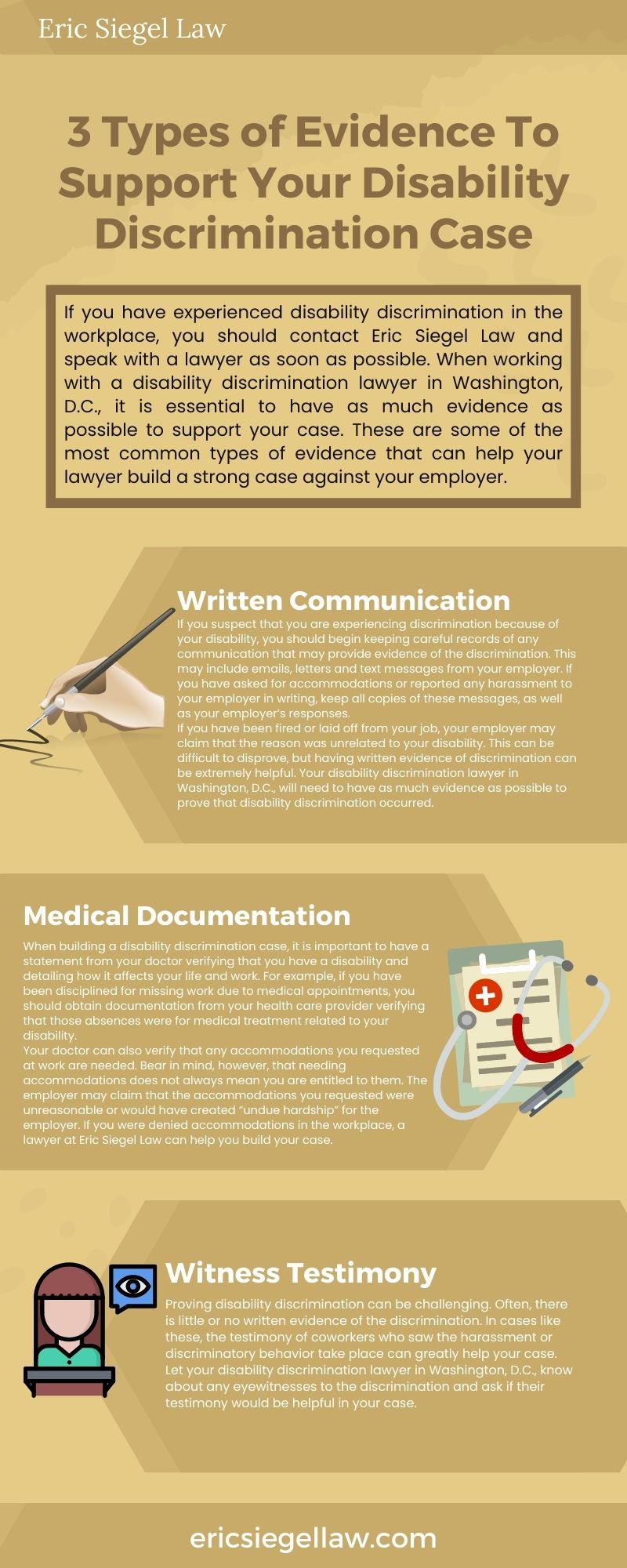Disability Discrimination Lawyer Washington, D.C.
If you’re being discriminated against for your disability at work, a disability discrimination lawyer Washington, D.C. residents trust may be able to help. What happened to you isn’t fair and you deserve justice for that. A lawyer can help you to file a timely claim and ensure your legal rights are protected.
What Is a Disability?
Broadly defined, a disability refers to any physical or mental impairment that prevents you from doing important activities. Major life activities may include walking, speaking, tending to personal hygiene, and seeing.
Legal Workplace Protections for Americans with Disabilities
When an individual with a disability (as defined in the Americans with Disabilities Act) is treated unfavorably in employment context, this unfavorable treatment is likely to be considered unlawful discrimination. This area of law is complex and no two discrimination cases are exactly alike, which is why it’s important to avoid making assumptions about your legal rights and remedies before you’ve consulted an experienced Washington, D.C. disability discrimination lawyer. However, as unfavorable treatment based on one’s status as a member of a protected class (including those with disabilities) is almost always considered unlawful discrimination, chances are good that if you’ve been mistreated as a result of your disability within the hiring process, termination process, or while you’ve remained actively employed, you may have grounds upon which to file legal action.
The Right to Reasonable Accommodation
Those with disabilities are entitled to receive reasonable accommodations to perform job duties, such as lowering the height of a desk to accommodate an employee in a wheelchair or providing TTD telephone equipment to an employee with a hearing impairment. Generally speaking, as long as an employee with a disability’s request for a work-related accommodation is reasonable (and allows that individual to effectively apply for a job, perform their job duties, and/or more fully enjoy the benefits and privileges of employment), an employer must grant this request. Employers may only reject reasonable requests for accommodation if, in fulfilling this request, the employer would experience “undue hardship.”
According to the U.S. Equal Employment Opportunity Commission, undue hardship “means that the accommodation would be too difficult or too expensive to provide, in light of the employer’s size, financial resources, and the needs of the business.” This isn’t to say that a refusal to grant the exact specifications of a requested accommodation amounts to discrimination. If a solution to an accommodation-based request works effectively (and doesn’t amount to unfavorable treatment, such as a solution that could be objectively considered humiliating), an employer doesn’t necessarily need to fulfil a request to an employee’s exact requested specifications. This is one example of the ways in which this area of the law tends to be complex and nuanced. If you have questions about how the fundamental rights of workers with disabilities and obligations of those in positions to hire, manage, and terminate these workers applies to your situation, please connect with the experienced District of Columbia legal team at Eric Seigel Law today to learn more.
Other Common ADA Violations
Note that to be protected in the workplace, a person with a disability must be qualified for the position. He or she has to possess the necessary degrees, experience, and skills required to perform the position. If you have a disability under the Americans with Disability Act (ADA), you should consult a disability discrimination lawyer in Washington, D.C. if you have been discriminated against at your job. Here are some examples of discrimination based on disability:
- Permitting Disability-Based Teasing: If an employer has allowed coworkers to make fun of you for your disability, you should speak to a disability discrimination lawyer in Washington, D.C.
- Not Considering Job Candidates with Disabilities: Unfortunately, some employers outright refuse to hire applicants with disabilities because they assume they won’t be able to do the job properly.
- Targeting Employees With Disabilities for Layoffs: If a company is facing financial difficulties, they may target employees with disabilities for layoffs first. They may believe that they aren’t as productive as employees without disabilities.
How To Fight Against Disability Discrimination
Disability discrimination is often hard to face. It can be embarrassing and difficult for the victim to believe or admit. It is a very serious issue though, and one that deserves the attention of both the victim and a quality disability discrimination lawyer in Washington, D.C.
If you believe that you have been singled out or treated differently at work because of your disability, then you may be a victim of disability discrimination. Here are a few important steps to take if you find yourself in this kind of situation.
1. Contact a Legal Representative
One of the first things to do is to contact a competent lawyer. Unlawful discrimination is a touchy and complex subject so you do not want to face this problem alone. The disability discrimination lawyers at Eric Siegel Law want to help. You need to have experience and knowledge on your side to properly argue and defend your case. Trying to fight on your own could even increase your discomfort and the hostility you experience in the workplace.
2. File Your Case
Once you consult a lawyer and determine that you might have a case, you should officially file your lawsuit. It is not advisable to attempt this alone without the assistance of a knowledgeable, reliable disability discrimination lawyer in Washington, D.C. You first have to establish that you do indeed have a disability under the rules of the Americans with Disabilities Act (ADA). You should also file all the correct paperwork on time and efficiently inform all the proper entities, including the Equal Employment Opportunity Commission (EEOC) and your employer. An experienced lawyer knows the ins and outs of this process and can help you navigate through all these steps.
3. Gather Evidence
Producing strong evidence is key to any successful lawsuit. Openly and honestly communicate everything with your disability discrimination lawyer in Washington, D.C. The more information you can provide to your attorney the better. Always enlist the help of your legal representative to investigate and collect your evidence as their experience and knowledge will help you determine what might help prove the discrimination and what will not. In these cases, the more specific details you can present the better, so do not leave any part out when speaking with your lawyer.
Remember that you have the right not to be mistreated or treated differently at work because of your disability. Remember too that you do not have to fight alone. Let the trustworthy lawyers at Eric Siegel Law help you in your battle against workplace disability discrimination.
Disability Discrimination FAQs
Disability discrimination can happen anywhere and at anytime. If you have suffered discrimination because of your disabilities, it is important to understand what exactly your rights are and what actions you need to take to ensure that those rights are properly protected. Eric Siegel Law can help you find a disability discrimination lawyer in Washington, D.C. The following frequently asked questions can help you better understand your situation.
What Types of Actions Qualify as Discrimination?
Discrimination can come in many forms, but there are some common types of disability discrimination that manifest in the workplace, including:
- Refusing to hire a candidate because of a disability
- Refusing to accommodate a disabled employee so that they can work
- Harassing an employee about their disability
Outside of the workplace, discrimination may manifest as a business refusing to accommodate a disabled customer or failing to provide an environment that is safe for disabled individuals according to local laws and building codes.
A disability discrimination lawyer in Washington, D.C. will be able to help you better understand whether or not you have been discriminated against.
What Action Can I Take If I Have Suffered Discrimination?
If you believe that you have suffered discrimination, you can seek out legal counsel from a disability discrimination lawyer in Washington, D.C. These knowledgeable professionals can help you understand which laws apply to your particular situation.
A claim of discrimination can be filed with the U.S. Equal Opportunity Commission. This is an organization that protects the rights of disabled citizens in the United States. A disability discrimination lawyer in Washington D.C. can help you understand if you have a legitimate claim.
What Types of Actions Should I Avoid If I’ve Been Discriminated Against?
If you believe that you have been discriminated against because of a disability, it is very important that you talk with a lawyer and avoid discussing the situation with your employer until you fully understand the severity of your situation. Employers will sometimes attempt to settle a discrimination charge privately with an employee. These types of arrangements do little to hold the employer or the workplace accountable for their actions. If you are approached by the other party and made an offer to settle the issue out of court, it is important that you discuss this with a disability discrimination lawyer in Washington, D.C.
The knowledgeable legal team at Eric Siegel Law can help you navigate your discrimination case in Washington, D.C.
3 Types of Evidence To Support Your Disability Discrimination Case
If you have experienced disability discrimination in the workplace, you should contact Eric Siegel Law and speak with a lawyer as soon as possible. When working with a disability discrimination lawyer in Washington, D.C., it is essential to have as much evidence as possible to support your case. These are some of the most common types of evidence that can help your lawyer build a strong case against your employer.
Written Communication
If you suspect that you are experiencing discrimination because of your disability, you should begin keeping careful records of any communication that may provide evidence of the discrimination. This may include emails, letters and text messages from your employer. If you have asked for accommodations or reported any harassment to your employer in writing, keep all copies of these messages, as well as your employer’s responses.
If you have been fired or laid off from your job, your employer may claim that the reason was unrelated to your disability. This can be difficult to disprove, but having written evidence of discrimination can be extremely helpful. Your disability discrimination lawyer in Washington, D.C., will need to have as much evidence as possible to prove that disability discrimination occurred.
Medical Documentation
When building a disability discrimination case, it is important to have a statement from your doctor verifying that you have a disability and detailing how it affects your life and work. For example, if you have been disciplined for missing work due to medical appointments, you should obtain documentation from your health care provider verifying that those absences were for medical treatment related to your disability.
Your doctor can also verify that any accommodations you requested at work are needed. Bear in mind, however, that needing accommodations does not always mean you are entitled to them. The employer may claim that the accommodations you requested were unreasonable or would have created “undue hardship” for the employer. If you were denied accommodations in the workplace, a lawyer at Eric Siegel Law can help you build your case.
Witness Testimony
Proving disability discrimination can be challenging. Often, there is little or no written evidence of the discrimination. In cases like these, the testimony of coworkers who saw the harassment or discriminatory behavior take place can greatly help your case. Let your disability discrimination lawyer in Washington, D.C., know about any eyewitnesses to the discrimination and ask if their testimony would be helpful in your case.
Consulting a Lawyer
When you’re being discriminated against at work for your disability, you might feel like you have nowhere to turn. However, you will feel much more confident about your case if you have a confident lawyer on your side. Once you speak with our legal team, with your permission, we will investigate your claim and make sure that your voice is heard.
Harassment in the Workplace
Harassment can take on many forms, and the intention is often to make the employee with a disability feel offended or embarrassed. By not protecting a disabled employee from such treatment, an employer may be held responsible through legal action. Based on the law, disabled workers are safeguarded from harassment by their bosses, customers, and co-workers. It is the role of an employer to see to it that their workplace doesn’t turn into a hostile working environment. If you have experienced any of the following because of your disability, we urge you to contact a discrimination lawyer Washington, D.C. residents can rely on immediately:
- Tactics to intimidate
- Direct or indirect bullying
- Comments or jokes that are harmful or offensive
- Refusing to offer reasonable accommodations for a worker’s disability
- Treatment of the employee with a disability differently than others
Overlooked for Raises and Other Opportunities
A disability does not mean that an employee doesn’t want to work hard towards promotional opportunities and raises within the company. Employers must foster a strong work ethic in every employee, regardless of a disability or not. If your employer refuses to give you a deserved promotion or wage increase because of your disability, they are breaking the law, and intervention from a qualified attorney is often needed. If you believe you may have a discrimination case, we can perform a case assessment and inform you of your options.
Call Eric Siegel Law Today For Help
Every person deserves to be treated fairly, no matter their disability or other characteristic. Employers may be committing workplace discrimination knowingly, or unknowingly. Sometimes people operate from a subconscious place, where they don’t realize what they are doing. You can trust that we can bring the issue to your employer’s awareness and ensure that you are given the compensation and justice you deserve for the mistreatment. For more information about how we can help, please call Eric Siegel Law today for help from our dedicated Washington, DC Disability discrimination Lawyers.
Social Media and the Potential for Workplace Discrimination Lawsuits
As people spend more and more time on social media, it becomes easier to track their lives and get a rough understanding of who they are. Companies know this, and social media sites sell data about each and every one of us to these companies. Social media is increasingly used as an advertising tool — potential customers can be pinpointed for various products, and advertisements for those products pop up on just about every website that person navigates to.
Just as companies are using data found on social media to sell products, employers are turning to Facebook, Instagram, Twitter, and other social media platforms to make employment decisions. However, as disability discrimination lawyers in Washington, D.C. know, this practice can be extremely risky for the employer should they accidentally make an employment decision based on a protected characteristic of their employee or job applicant.
Discrimination During the Hiring Process
More than 70 percent of American adults use Facebook, according to national research, and that percentage point is higher for middle-aged and young adults. An employer can quickly gather information about an applicant using their Facebook accounts, such as their political affiliation, favorite genre of movies and books, hobbies, and other interests. An employer could potentially use Facebook for more sinister purposes, such as figuring out the applicant’s age, gender, race, sexual orientation, ethnicity, religion, pregnancy status, marital status, and country of origin. If it is found out that an employer based their decision to not hire the applicant on any of those protected personal characteristics, Washington, D.C. disability discrimination lawyers know the applicant could sue.
Discrimination of a Current Employee
National surveys show that the majority of people believe that it is not okay to be Facebook friends with one’s boss, most people do believe that it is perfectly fine to be Facebook friends with other colleagues. This should give an employer an idea about how their employees feel about their social media being used to make employment decisions — that they do not think it is appropriate.
However, just because it is something they should not do, the fact is employers do use social media to fire, demote, or promote someone. Unless an employee’s behavior displayed on social media is illegal, unethical or immoral, is considered hate speech, or is hurting an employer’s business, the employer should not use social media information to make an employment decision. Doing so could open them up for a discrimination lawsuit if the employee’s protected characteristics came into play.
Call Our Office Today
Employers stand a lot to lose, and not a lot to gain by using social media for making employment decisions. If you have questions about an action that your employer has taken against you based on your social media or feel you have been a victim of employment discrimination, contact the skilled Washington, D.C. disability discrimination lawyers of Eric Siegel Law today for legal guidance.
To schedule a free consultation, contact an experienced Washington, D.C. disability discrimination lawyer at Eric Siegel Law Firm to discuss your case in detail.




